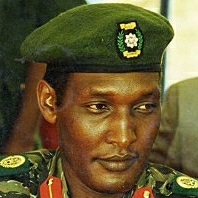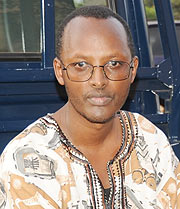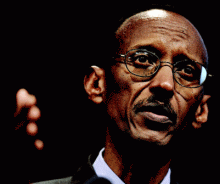Rwanda’s Paul Kagame talks with CNN about genocide accusations
Becky Anderson talks with Rwandan President Paul Kagame about accusations of genocide of Hutus by Rwandan troops in the Congo.
[HTML1]
September 17, 2010 No Comments
Spain wants Rwanda general Nyamwasa extradited for genocide

Spain requested on Friday that South Africa extradite an exiled Rwandan general who it wants on charges including genocide and killing four Spaniards in Rwanda in the 1990s, the Justice Ministry said.
The Spanish High Court has charged Lieutenant-General Faustin Kayumba Nyamwasa with genocide and with the murder of a Spanish missionary in 1994 and three Spanish aid workers in 1997.
“He took part in systematic and planned attacks on the civilian population, in forced disappearances and crimes against international law, also, organising and executing terrorist attacks,” a ministry statement said.
Nyamwasa fled to South Africa this year after falling out with Rwandan President Paul Kagame and later accused him of using an anti-corruption campaign to frame opponents.
The general fought alongside Kagame to end the 1994 genocide in the central African nation. During and after that war he held a number of key positions, including army chief of staff and head of the country’s intelligence services.
Nyamwasa was shot in the stomach in June in what his wife called a Rwandan-backed assassination attempt. South African police arrested four people for the attack.
[Source: Reuters]
September 17, 2010 3 Comments
Rwandan High Court sentences opposition politician Deo Mushayidi to life

�Si vous m�aimez, soutenez la cause que j�ai d�fendue et que je d�fendrai de mon vivant�
Kigali – Sept.17 – Opposition politician Deogratias Mushayidi will spend the rest of his life behind bars after he was found guilty on three of the seven very serious charges, the High Court ruled Friday.
Mushayidi, who was arrested in Tanzania � handed to Burundi, which immediately extradited him to Rwanda, was found guilty on three counts including: causing state insecurity, using forged documents and inciting citizenry against established authority.
The defense led by Kigali lawyer Christophe Twagirayezu told reporters after the verdict that he was going to appeal in the Supreme Court.
In addition to the life sentence, Mushayidi was ordered to pay 73,150 Francs (Approx. US$130) as court charges.
The High Court however cleared the controversial ex-head of the Association of Rwandan Journalists (ARJ) of four charges.
They included: promoting Genocide revisionism, ideology and sowing seeds of divisionism; terrorism and collaboration with armed groups with intent to oust a legitimate government.
Prosecution had prayed to court on August 23 to slam Mushayidi with three separate sentences including two life sentences and 50 years in jail for all the charges against him.
Mushayidi � who has been in detention at the maximum security jail here in Kigali, was not in court to hear his verdict.
– D�o Mushayidi au peuple Rwandais: �L�ve-toi, mon peuple�.
– Ubutumwa bwa Deo Mushayidi ku Banyarwanda: �Nimuhaguruke�
The outspoken politician was arrested and subsequently extradited to Rwanda on March 5 this year. The state produced several witnesses and documents showing how the head of Belgian-based PDP-Imanzi political group had been collaborating with the Rwandan FDLR rebels in DR Congo.
At some point, prosecution alleged Mushayidi was part of a �terror network� with exiled Lt. Gen. Kayumba Nyamwasa and Col Patrick Karegeya � both on political asylum in South Africa. They are said to be operating in this region � but no specifics have been availed.
During the trial, prosecution brought a person described as a �high profile witness� by the names of Samuel Nsengiyumva whom court heard was Mushayidi�s close partner. Prosecution said they had been working together on preparing armed rebellion from Tanzania.
Before fleeing Rwanda in 2000, Mushayidi headed the local journalists� grouping � from which he is alleged to have disappeared all its finances which had been provided by UNESCO.
A former combatant of the RPF rebels, he would turn out to be a fierce critic of President Kagame from the safety of Europe � where he joined up with various opposition groups.
[ARI-RNA]
September 17, 2010 No Comments
Rwandan genocide suspect Paul Kagame delivers an Oppenheimer lecture at The International Institute For Strategic Studies (IISS)
On Thursday 16 September 2010, General Paul Kagame, President of the Republic of Rwanda, delivered the 2010 Oppenheimer Lecture – ‘The Challenges of Nation-Building in Africa‘.
This lecture is made at a period when embattled the Rwandan General is deploying all his means to dilute the findings of the UN Mapping report (due for publication delayed until October 1st) which established that Kagame-led army has been committing acts of genocide against Hutus in the neighboring Democratic Republic of Congo. Experts estimate that the invasion of Congo by Kagame-led army already cost lives to more than 6 million people.
Watch the Lecture and the Q&A Session.
September 17, 2010 2 Comments
Defiant Rwandan genocide suspect Kagame attacks UN and says he needs freedom from human rights organisation
* Rwandan leader says allegations in U.N. report “baseless”
* Says Rwanda needs freedom from human rights organisation
Rwandan President Paul Kagame attacked the United Nations on Thursday over a leaked report saying Rwandan troops may have committed genocide and criticised a rights group that found fault with last month’s election.
Rwanda threatened to pull out its troops from U.N. peacekeeping missions last month after the leaked report on crimes alleged to have been committed by various forces in the Democratic Republic of Congo during the 1990s, including the charge that Rwandan troops may have committed genocide.
Asked if the report damaged his legitimacy, Kagame said: “I don’t imagine that my legitimacy is something that would just be washed away by such allegations.”
Kagame, answering reporters’ questions after giving a speech at London’s International Institute for Strategic Studies, said the allegations in the U.N. report were “baseless and totally untrue and flawed in many ways, right from the authors of the report to the methods used“.
“If there was anything to be questioned about anything that could have gone wrong either in the Congo or the Great Lakes region or particularly in Rwanda, it should have been the U.N. to really be held accountable for that,” he said.
U.N. Secretary-General Ban Ki-moon took Rwanda’s threat to withdraw peacekeepers so seriously he flew to Rwanda last week to talk to Kagame. Ban said they had agreed on the importance of Rwanda staying in peacekeeping operations.
Kagame said the countries mentioned in the report were working with the U.N. “to find where to place the problems they referred to”.
RIGHTS GROUP CRITICISED
U.N. peacekeepers were widely criticised for failing to prevent the 1994 slaughter of 800,000 Tutsis and moderate Hutus in Rwanda that ended only after Tutsi-led fighters under Kagame retook control of the country.
Rwanda’s army then invaded Congo, ostensibly to hunt down Hutu fighters who had taken part in the killings and fled into eastern Congo, then known as Zaire.
In the process, Rwandan forces helped sweep the Congolese AFDL rebels of Laurent Kabila to power in Congo. Both forces have been accused of a string of rights abuses against Hutu fighters and civilians across the country.
Kagame, re-elected last month with 93 percent of the vote, has been praised for rebuilding Rwanda and establishing peace in the aftermath of the 1994 genocide, but his government has also faced accusations of stifling political opposition.
Kagame sharply rebuked a representative of New York-based rights group Human Rights Watch who asked whether he planned to expand the “political space” in Rwanda so future elections could take place in an atmosphere of genuine political competition.
Human Rights Watch researcher Carina Tertsakian said last month the election was marked by a “climate of intimidation and exclusion of the opposition and critical voices”.
“Rwandans have no problems of freedom. It is important you respect them and respect their opinion as well,” Kagame told Tom Porteous, head of Human Rights Watch’s London office.
“I also want to say we probably need freedom from Human Rights Watch,” he said.
Source: Reuters
[AlertNet]
September 17, 2010 1 Comment
Genocide suspect General Paul Kagame wants �freedom from Human Rights Watch�
by Aimable Mugara.
Show me someone who attacks human rights groups and I will show you a criminal.
2010 has not been a very good year for General Kagame, the Rwandan President. He claims to have won the election with 93 percent of the vote. He might as well claim that he got 100 percent considering how his �victory� only came after the suspicious beheading of an opposition leader, the suspicious murder of an independent journalist, the jailing of journalists, the jailing of opposition leaders, the jailing of opposition lawyers, the shutting down of independent media, and preventing opposition parties from taking part in the election.
A few weeks before the election, General Kagame was snubbed by Spanish Prime Minister Jose Luis Rodriguez Zapatero, who refused to meet Kagame because Spanish courts have accused Kagame�s top 40 army officers of war crimes, crimes against humanity and genocide. This happened after pressure from Spain�s civil society and several political parties who did not want their Prime Minister to be seen with someone that Spain�s courts deem to be one of the worst criminals alive today.
A few months before that, Kagame had to run away from a graduation ceremony in Oklahoma where he was supposed to be the guest of honor. He ran away to escape from being served the court papers for a federal civil suit in Oklahoma brought against him by the widows of the two presidents that were killed in 1994, the event that sparked the 1994 Rwandan genocide. The widows sued Kagame arguing that they have evidence that Kagame is the one who committed that terrorist act. Kagame ran away to avoid being served.
A couple of months before that, his former close friend General Kayumba Nyamwasa who was also his Army Chief for many years ran away from Kagame and fled to South Africa. Later on, there was an assassination attempt against this General and the General says that he has no doubt that the attempt on his life was ordered by Kagame himself. Considering that South Africa has since withdrawn its ambassador from Rwanda, it appears that South Africa�s investigation may be pointing to Kigali too.
But the biggest nightmare ever for Kagame was when a UN draft report on crimes committed in the Democratic Republic of Congo was leaked to the media. The UN draft report shows that for a period of 10 years, Rwanda�s current Tutsi army committed genocide in the Congo against Hutu civilians. The report, which will be officially published on October 1, 2010 shows that the so-called �good guys� in Rwanda�s conflict are anything but. There is already a UN court that has been trying crimes committed by extremist Hutus. In order to end the culture of impunity on both sides in Rwanda, it will be vital to establish a UN court to try these genocide killings that were committed by the Tutsi army too.
With such a year, no wonder today when he was speaking to media in London (UK), he said that he wants �freedom from Human Rights Watch.� Show me someone who attacks human rights groups and I will show you a criminal.
September 17, 2010 1 Comment


